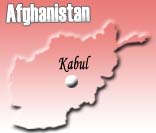Afghans' hopes for peaceful future fading fast, finds poll
 Kabul - Seven years after the fall of the Taliban, the number of Afghans hopeful of a peaceful future for their troubled country is dwindling fast, according to a survey published Monday.
Kabul - Seven years after the fall of the Taliban, the number of Afghans hopeful of a peaceful future for their troubled country is dwindling fast, according to a survey published Monday.
Just 40 per cent of those asked thought their country was heading in the right direction, in a nationwide poll funded by the BBC, US broadcaster ABC and Germany's WDR/ARD.
Three years ago - the last time a similar poll was carried out - nearly twice as many Afghans, 77 per cent, were hopeful about the future.
Against a backdrop of daily war and grinding poverty, the initial trust of the population in the country's reconstruction has turned to resignation and rejection.
While in the north of the country a deep-seated economic malaise accounts for the pessimistic mood of the people, in the south life is a daily battle for survival in the face of everyday violence.
Here the verdict of the Afghans on the US-led coalition and NATO- led International Security Assistance Force (ISAF) is overwhelmingly negative. Only one-third (32 per cent) of those surveyed were satisfied with their efforts, compared with 68 per cent just three years ago.
Around half the Afghan population want a rapid withdrawal of international forces. In the south west of the country, which has seen the most intense fighting, the figure is 71 per cent.
Nationwide, more people than ever report being the victim of violence, or knowing someone who is. The figures suggest around 43 per cent of civilian casualties are at the hands of the Taliban, 34 per cent by international forces, and 24 per cent by Afghan military or police.
In the areas of the heaviest fighting - Helmand province in southern Afghanistan and neighbouring Kandahar - almost everyone knows a civilian victim of US attacks: 92 per cent of respondents in Helmand and 78 per cent in Kandahar.
These attacks were described as "unacceptable" by 77 per cent of Afghans.
President Hamid Karzai's own approval ratings have also plummeted - from 83 per cent in November 2005 to 52 per cent now. That mirrors trust in central government, down from 80 per cent to 49 per cent over the same period.
Public trust is also an issue, with 85 per cent of people saying corruption was an issue in civic administration and the police, with 63 per cent calling it a "very big" problem.
However, two-thirds of the population (68 per cent) continue to believe the Taliban is the biggest security threat in Afghanistan. But only a third (33 per cent) think there can be a military victory over the Islamist extremists. Another third hopes for a negotiated settlement with the Taliban, 19 per cent fear an endless war of attrition and eight per cent forecast victory for the Taliban.
In order to end the conflict, 64 per cent would back a negotiation with the Taliban which would see the extremists participate in power.
Poverty was found to be widespread. More than half of all households in Afghanistan survive on less than 100 US dollars a month. Only one third (37 per cent) of households can afford sufficient food, and only 31 per cent afford the cost of heating oil.
The survey was based on the answers of 1,534 selected and representative Afghans from all 34 provinces of the country. Each respondent was asked a total of around
100 questions by trained interviewers from the Afghan Institute for Social and Public Opinion Research. (dpa)